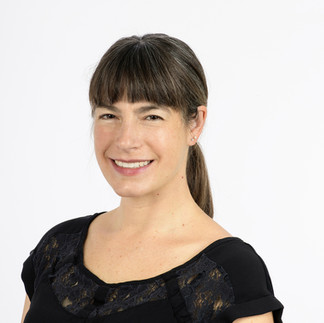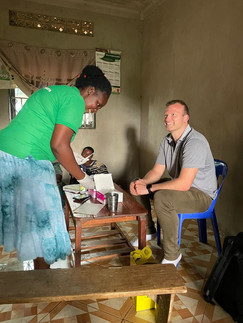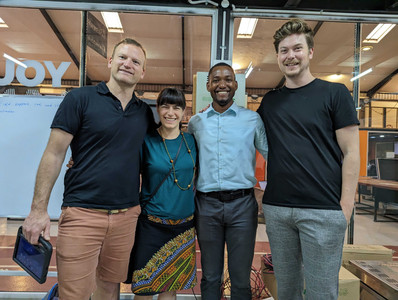Adrian Schauer, Dr. Gillian Morantz and James Fraser
- Benny Axt
- Jul 17, 2024
- 9 min read
Updated: Jul 22, 2024

A Love Story: The Founding of Madiro
The captivating genesis of Madiro, a philanthropic investment fund, intertwines a poignant personal narrative with a transformative vision for global health. At the heart of this story is a profound act of love and commitment, set against a backdrop of vital humanitarian work.
In the summer of 2011, while Dr. Gillian Morantz was immersed in a Kenyan hospital, carrying out a study on children living in orphanages, her passion and dedication caught more than just the professional eye of Adrian Schauer, her future husband. Inspired by Gillian’s relentless pursuit of global health improvements, Adrian, a fervent advocate for health technology and innovation, found a unique way to blend their shared interests into a life-changing proposal. In an earnest bid to win her heart and unite their dreams, Adrian proposed to Gillian with a promise to build a foundation to foster global healthcare development. This deeply personal moment not only marked the beginning of their life together but also the conceptual birth of what would later become Madiro.
The foundation's name, "Madiro," meaning "desire" in Shona, a language spoken in Zimbabwe, holds a special significance, echoing a story of compassion that predates even Gillian's clinical work. Before embarking on her medical career, Gillian had spent time in Zimbabwe working in an orphanage where she met a young boy named Desire. Tragically, Desire’s life was marred by illness and loneliness, and despite Gillian’s efforts to aid him, he passed away. This touching encounter left a lasting impact on Gillian, and when the time came to rename their foundation, "Madiro" was chosen to honor the memory of the boy whose struggle had touched her so deeply.
Thus, the foundation’s journey began with an intertwining of personal commitment and professional dedication, symbolizing a union of love, loss, and the relentless pursuit of health equity. Through supporting innovative digital health initiatives and sustainable health solutions, Adrian and Gillian's joint efforts embody their foundational belief in the power of combined expertise to foster significant, lasting change in the global health landscape.
The Core Team and Their Vision
From Left to Right: Adrian Schauer, Dr. Gillian Morantz and James Fraser
Adrian Schauer is a serial and visionary entrepreneur in the realm of technology and healthcare innovation. In 2023, he was named Digital Health Executive of the year by Digital Health Canada. As the founder and CEO of AlayaCare, he brings forward-thinking solutions to home healthcare, merging technology with care to revolutionize patient management. Outside of AlayaCare, Adrian is an investor, philanthropist and corporate director, with influential leadership roles in companies like ClinicMaster which showcase his commitment to advancing healthcare technologies.
Gillian’s early travels ignited a passion for global health that would define her career. A pediatrician from Montreal, she spent the formative years of her career working in Ghana, Zimbabwe, Burkina Faso, Botswana, Kenya, and Haiti. Today, she specializes in social pediatrics at McGill University, where she advocates for children in vulnerable situations. Her role as a pediatrician and an academic in global child health uniquely positions her to guide Madiro’s investments towards initiatives that address critical health issues facing children in low and middle-income countries. She has a particular interest in initiatives that integrate health services with essential support systems, such as health education and nutrition programs, which are critical for comprehensive child care.
Madiro is not just a narrative of its founders but also of key figures like its CEO, James Fraser, whose story is marked by resilience and purpose. James’ professional journey embodies a remarkable blend of humanitarian service, innovative entrepreneurship and an unwavering commitment to global health. James spent 7 years with Médecins Sans Frontières (Doctors Without Borders), where he excelled in numerous non-medical roles, frequently deployed to emergency zones where he orchestrated logistical support and project management alongside medical professionals. His tenure at MSF proved to be an invaluable entrepreneurial bootcamp, teaching him how to adapt to new challenges, languages, and environments.
In 2002, at the peak of the HIV/AIDS epidemic, James founded Dignitas International, a medical research NGO dedicated to decentralizing access to HIV treatment in Africa. During a time when 2.4 million people were dying annually from HIV/AIDS, Dignitas focused on not just treating the afflicted - ultimately serving half a million patients - but also on training health workers and wrapping their efforts in operations research. This strategic approach enabled Dignitas to generate compelling evidence to influence international policy.
In 2021, after Adrian and Gillian reinvigorated Madiro with a donation of $10 million, they brought James on board to serve as CEO. This investment came on the heels of AlayaCare's monumental $225M financing round. The infusion of capital not only jumpstarted Madiro's efforts but also served as a clarion call to action, galvanizing the foundation's resolve to champion groundbreaking solutions that address pressing global health challenges.
Lessons Learned: A Strategic Evolution
Initially conceived as a granting agency to support health initiatives, Madiro's strategy underwent a significant transformation over a decade as the landscape of global health shifted towards a more sustainable model of social enterprise between 2012 and 2022.
James reflects on the early days of the foundation, describing it as a period of searching for the right approach. "We chased our tail a bit, trying to figure it out," James admits. The traditional charity-based model, which he was accustomed to from his days at Dignitas, soon proved limiting in a context where much of the rapidly scaling innovations were happening within burgeoning social enterprises across Africa. These young, driven entrepreneurs were not just tackling health challenges but were also crafting sustainable business models that required a different kind of support.
"There was one wrong turn we almost took," James reveals, illustrating the perils of navigating investment and impact. As excitement built around social entrepreneurship, Madiro contemplated becoming General Partners (GPs), managing investments through a traditional GP-LP (General Partner-Limited Partner) structure. This path promised to extend their influence by managing other people's money and potentially amplifying their impact.
However, as discussions advanced, a critical concern emerged. "We realized that this approach might put the return on investment above the impact," James explains. This realization struck a chord, especially with Gillian, as the team grappled with the implications of prioritizing financial returns over social outcomes. For social investors, the idea of returning slightly less money (e.g., 80 cents on the dollar) could still be seen as a success due to the significant social impact achieved. Yet, for traditional investors, this would represent a loss, complicating the fundraising and operational model.
This introspection led Madiro away from establishing a venture fund, redirecting them back to their roots in philanthropy combined with venture-style investing. "It was an almost path, and I'm pretty happy with the pivot we took," Adrian reflects, appreciating the clarity this challenge brought. Instead of creating a fund, Madiro embraced a model where donors can contribute directly to their mission, receiving charitable tax receipts, thus aligning financial contributions with philanthropic goals.
This new strategy, now at the heart of Madiro's mission, is exemplified by their concept of an impact exit. This approach is not only about financial gain but about creating lasting change through strategic engagements. Madiro’s shift towards this investment-driven model of philanthropy illustrates a broader trend in global health: the recognition that sustainable impact requires more than just funding - it requires strategic partnerships, capacity building, and a deep understanding of the changing dynamics of healthcare needs and solutions. By embracing this model, Madiro is not just funding change but is actively participating in the transformation of healthcare across Africa.
Now, Madiro operates with the best of both worlds, maintaining the spirit of philanthropy while harnessing the rigor and strategic approach of venture funding. This alignment ensures that every investment not only generates returns but more importantly, catalyzes significant social change, embodying the true essence of impact investing.
Selective Investment: Aligning Opportunities with Mission and Vision
At Madiro, the abundance of potential projects requires a discerning approach to investment, ensuring that each one aligns with their overarching goals of impact, sustainability, and effective execution. "We look at investments that are solving intractable challenges - those formidable issues that have persisted unresolved for decades," James explains. This focus ensures that Madiro contributes to breakthroughs in healthcare that can significantly advance the field and provide solutions where they are most needed.
Once a potential investment passes the initial screens, Madiro engages in a thorough due diligence process, delving deeper into the specifics of the proposal and the team behind it. This rigorous evaluation ensures that only the most aligned and promising ventures receive support, optimizing the impact of Madiro’s resources and efforts.
Through this selective approach, Madiro not only ensures that its investments are poised for success but also upholds its mission to catalyze significant and sustainable improvements in global health. By focusing on innovation, scalability, and team excellence, Madiro positions itself as a catalyst for transformative solutions in the healthcare sector.
A Beautiful Success: Ubuntu Village of Life
Madiro’s work has resulted in many success stories, but the Ubuntu Village of Life initiative stands out as a testament to grassroots leadership and ingenuity. Dr. Alexis Nizigiyimana, born into a large, low-income family in Burundi, grew up facing significant healthcare challenges. With a medical degree from the University of Burundi and Master degrees in public health from prestigious institutions in Israel, Canada, and the United States, Dr. Alexis has become a beacon of hope for his community. As the founder and CEO of Ubuntu Village of Life, he envisioned a future where holistic care was not a luxury but a fundamental right for all.
When Madiro first encountered Ubuntu Village of Life, Dr. Alexis had already made significant strides. The original clinic operated out of a village bar, providing outpatient, ophthalmology, and laboratory services. Across the road, a renovated house, known as the "Mama Baby Pavilion," housed 25 beds for maternity care. However, the facilities were cramped and posed significant infection control risks, especially during the COVID-19 pandemic.
Recognizing the urgent need for infrastructure investment, Madiro stepped in to provide critical support. During his first visit to Ubuntu, James saw firsthand the limitations of the existing facilities. Initially approached for solar panels, he realized that the real need was more substantial infrastructure. James was staying in a local motel that appeared to have been largely vacant. On a whim, he inquired how much it might cost to buy the motel. The price was only twice the cost of the solar panels so Madiro stepped in to finance the purchase, which has transformed the healthcare landscape of the community. Madiro leases the property to Ubuntu Village of Life while also providing working capital on an annual basis for operational support. This support has enabled Alexis to scale up the clinic by hiring staff and covering essential expenses.
The journey has not been without its challenges. While the clinic initially struggled with overcrowding and resource limitations, Madiro’s intervention provided the necessary infrastructure to address these issues. Subsequently, the US government contributed $500,000 worth of medical equipment, including incubators, laboratory equipment, and an x-ray machine. However, the clinic soon realized that the quality of the local power supply was insufficient to operate the new equipment. Madiro committed to funding the rewiring of the facility, while Dr. Alexis successfully lobbied the Burundian government to install a new transformer, ensuring stable and reliable electricity.
Today, the Ubuntu Village of Life is on the path to becoming a center of excellence for maternity and neonatal care. The facility now boasts modern equipment and a reliable power supply, enabling it to offer high-quality healthcare services to the community. Dr. Alexis’s vision extends beyond healthcare. The Village features a cultural training center with agricultural initiatives and a school for teaching English, computer science, and entrepreneurship skills. The Village has successfully integrated health, education, and economic empowerment under one roof.
The story of Ubuntu Village of Life exemplifies Madiro's ethos: empowering communities, inspiring change, and improving lives through strategic investment and unwavering commitment. The organic synergy of community engagement and strategic investment represents the pinnacle of Madiro's transformative impact, illustrating the profound change that can be achieved when vision, innovation, and community solidarity converge.
Madiro's Vision for the Future: Scaling Impact and Fostering Sustainable Development
Over the next decade, Madiro sets a bold course to expand its influence and deepen its impact in global health and social entrepreneurship. With a target of managing $100 million in assets and impacting 30 million lives by 2028, Madiro's goals are quantifiable and audacious. Beyond these numbers, the vision involves making more than 20 additional investments that embody the principles of innovation, sustainability, and significant social return.
Madiro's strategy is designed to demonstrate how investments can create ladders of opportunity, a concept that can attract large development finance institutions (DFIs) and other major players in global development. By focusing on creating systems that enable people to elevate themselves and their communities, Madiro aims to contribute to closing the significant health and economic disparities that still exist between regions like North America and Africa.
The financial strategy is intertwined with the social mission - any returns on investment are reinvested into the pool to magnify the impact. This reinvestment strategy is crucial for sustaining and scaling Madiro’s efforts, reflecting a commitment to long-term growth and effectiveness. James highlights the importance of a robust fundraising plan and the feasibility of achieving these ambitious targets, noting the unique model of Madiro which draws inspiration from similar global initiatives like Zurich's elea Foundation and the Acumen Fund.
The broader aim is to transform the perception of Africa from a charity case to a vibrant market full of potential. This shift involves treating investments not just as aid but as catalysts for sustainable wealth creation, empowering individuals and communities to improve their own lives. This perspective aligns with the philosophy of teaching a man to fish, then showing him how to build ponds in a scalable, market-driven way.
Madiro prides itself on being a source of patient capital, intensely engaged with the companies it invests in. This approach goes beyond mere financial support - it involves a deep commitment to the success of each venture, emphasizing the value of building relationships and fostering long-term development over short-term gains. The goal is not just to fund companies but to ensure they thrive and contribute to their communities.

















